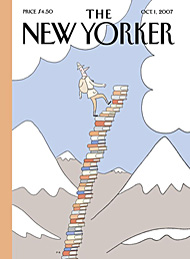
If you were to conjure up the book that is most dissimilar in setting, perspective, and outcomes to
Oliver Twist, it might be
Cranford by Elizabeth Gaskell. Her wonderful book has a sublime rendition in the
BBC production.
Cranford is far removed from the fiction of Gaskell's contemporary, Charles Dickens, in that it describes idyllic domesticity in a quiet English village at a time when industry and poverty ran rampant in England's larger cities. However...
"... for all its frills and teacups Cranford does not shy from the
grim realities of life in Victorian England -- a man's life is threatened
because the doctor does not have enough candles by which to operate; little
coughs give way to fatal fevers; and women, of course, are at the financial
mercy of their inheritance or marriage." Mary McNamara, Los Angeles Times
And the ladies' uncertain finances are a crucial aspect of the novel's conclusion.
Cranford is peopled by unmarried or widowed women who live happily in each other's society, and the story reflects to an almost revolutionary degree (for its time) the power of female friendship. The book began as a series of related stories published in Household Words, a magazine published by Dickens. Set in 1842, the story is rich with little scenes of gentle humor, such as how best to eat an orange, or the very funny tale of the cat and the lace collar. It makes a good comparison/contrast subject with any of the works of Jane Austen, in the sense that marriage is Austen's driving force but something of a nuisance to Gaskell.












